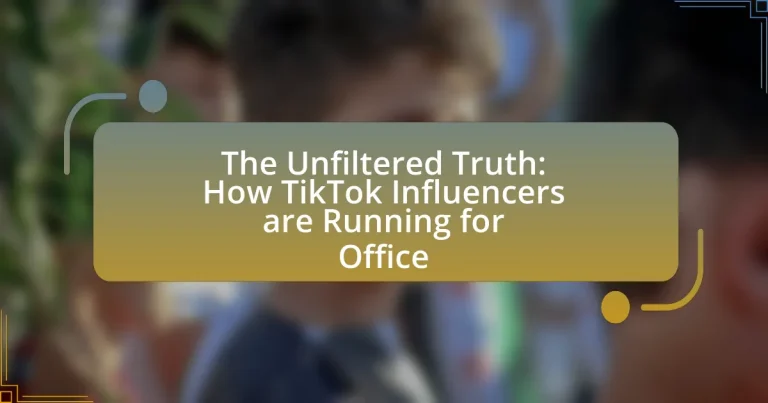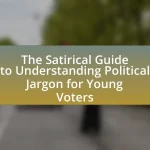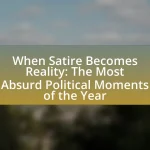The article examines the growing trend of TikTok influencers running for political office, highlighting how these social media personalities engage younger voters and reshape traditional political campaigning. It discusses the unique features of TikTok that facilitate political engagement, such as its algorithm-driven content discovery and interactive elements. The motivations behind influencers entering politics, the challenges they face, and the implications of their involvement in political discourse are also explored. Additionally, the article outlines strategies influencers use to connect with voters and the importance of authenticity in their campaigns, while addressing the potential risks and lessons learned from this phenomenon.
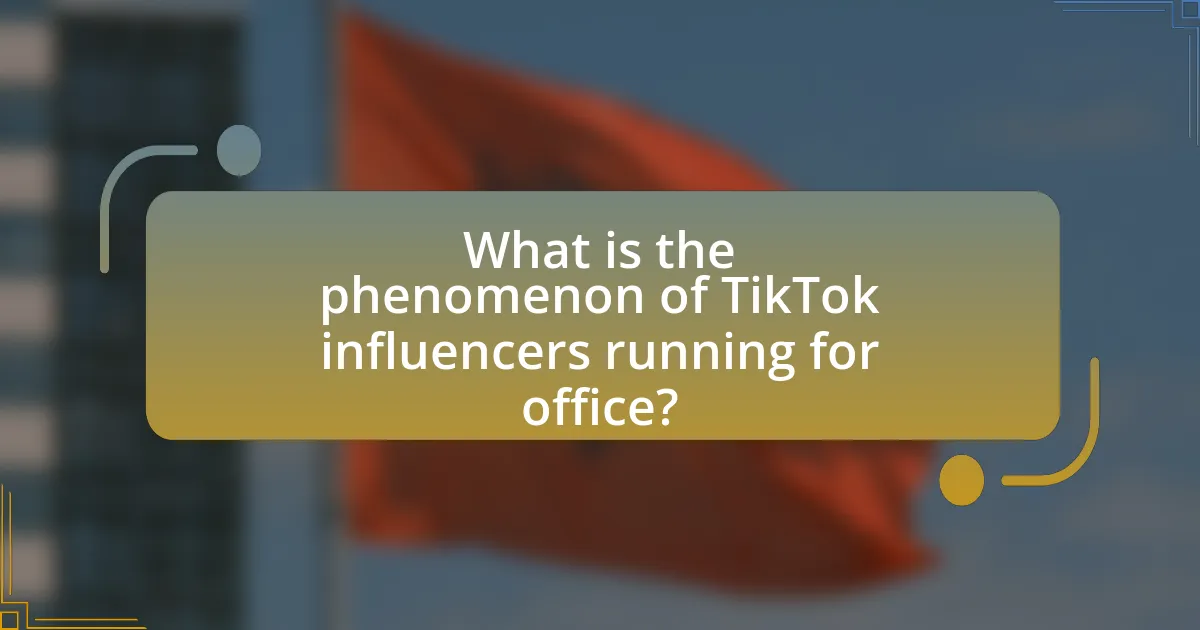
What is the phenomenon of TikTok influencers running for office?
The phenomenon of TikTok influencers running for office involves social media personalities leveraging their platforms to engage younger voters and promote political campaigns. This trend has emerged as influencers, who often have large followings and significant engagement, utilize their reach to discuss political issues, mobilize support, and even announce candidacies. For instance, in the 2020 U.S. elections, several TikTok users gained attention for their political activism, with some successfully running for local offices, demonstrating the platform’s potential to influence traditional political landscapes.
How has TikTok changed the landscape of political campaigning?
TikTok has transformed the landscape of political campaigning by enabling candidates to engage younger voters through short, impactful videos. This platform allows for creative storytelling and direct communication, making political messages more relatable and accessible. For instance, during the 2020 U.S. elections, candidates like Joe Biden and Donald Trump utilized TikTok to reach millions of users, with Biden’s campaign generating over 1 million followers in just a few months. The platform’s algorithm promotes content virality, allowing grassroots movements to gain traction quickly, as seen with the viral “TikTok for Biden” campaign. This shift emphasizes authenticity and relatability, as influencers and everyday users can amplify political messages, reshaping traditional campaign strategies.
What unique features of TikTok contribute to political engagement?
TikTok’s unique features that contribute to political engagement include its algorithm-driven content discovery, short-form video format, and interactive elements like duets and challenges. The algorithm promotes viral content, allowing political messages to reach a broad audience quickly, as seen in campaigns that leverage trending sounds or hashtags to engage users. The short-form video format encourages concise messaging, making complex political issues more digestible. Additionally, interactive features enable users to participate in discussions and express their views creatively, fostering a sense of community and activism. These elements collectively enhance user engagement and mobilize political discourse on the platform.
How do TikTok influencers leverage their platforms for political purposes?
TikTok influencers leverage their platforms for political purposes by creating engaging content that raises awareness about political issues and mobilizes their followers to take action. They utilize trends, challenges, and viral formats to disseminate information about voting, social justice, and policy changes, effectively reaching younger audiences who may be less engaged in traditional political discourse. For instance, influencers have successfully encouraged voter registration drives and participation in protests, as seen during the 2020 U.S. elections when TikTok campaigns significantly increased youth voter turnout.
Why are TikTok influencers choosing to run for office?
TikTok influencers are choosing to run for office primarily to leverage their substantial online following to engage younger voters and address social issues. This trend is driven by the recognition that social media platforms, particularly TikTok, have become powerful tools for political communication and mobilization. For instance, influencers like Alexandria Ocasio-Cortez and others have demonstrated that digital engagement can translate into real-world political support, as evidenced by increased voter turnout among younger demographics in recent elections.
What motivations drive influencers to enter politics?
Influencers are driven to enter politics primarily by the desire to effect social change and leverage their platforms for advocacy. Many influencers recognize their ability to mobilize large audiences and influence public opinion, which can be harnessed to address pressing societal issues such as climate change, social justice, and healthcare reform. For instance, influencers like Alexandria Ocasio-Cortez, who gained prominence through social media, illustrate how digital platforms can amplify political messages and engage younger voters. This trend is supported by research indicating that social media engagement can significantly impact political participation, particularly among younger demographics.
How do influencers perceive their impact on political discourse?
Influencers perceive their impact on political discourse as significant and transformative. They believe their ability to reach large audiences on platforms like TikTok allows them to shape opinions, mobilize followers, and engage younger demographics in political conversations. Research indicates that influencers often view themselves as catalysts for change, using their platforms to raise awareness about social issues and encourage political participation, particularly among Gen Z voters. For instance, a study by the Pew Research Center found that 50% of young adults believe social media influencers play a crucial role in shaping political views.
What challenges do TikTok influencers face in their political campaigns?
TikTok influencers face significant challenges in their political campaigns, primarily due to platform limitations, audience engagement issues, and regulatory scrutiny. The platform’s algorithm can restrict visibility, making it difficult for influencers to reach a broader audience despite having a large follower count. Additionally, the transient nature of TikTok content means that messages can easily be lost or misinterpreted, complicating effective communication of political messages. Regulatory scrutiny, particularly regarding campaign finance laws and misinformation, poses another challenge, as influencers must navigate complex legal landscapes while maintaining authenticity and trust with their audience. These factors collectively hinder the effectiveness of political campaigns conducted by TikTok influencers.
How does public perception affect their candidacy?
Public perception significantly impacts a candidate’s viability in elections, particularly for TikTok influencers running for office. Positive public perception can enhance a candidate’s appeal, leading to increased support, engagement, and voter turnout. For instance, influencers with a strong, relatable online presence often cultivate a loyal following, which can translate into a dedicated voter base. Conversely, negative public perception can diminish a candidate’s chances, as seen in cases where social media backlash has led to decreased support and funding. Research indicates that candidates who effectively manage their public image on platforms like TikTok can leverage their influence to shape voter opinions and mobilize their audience, thereby directly affecting their candidacy outcomes.
What legal and logistical hurdles must they overcome?
TikTok influencers running for office must overcome various legal and logistical hurdles, including compliance with election laws and campaign finance regulations. These influencers must navigate federal, state, and local laws that govern candidacy, which often require filing paperwork, disclosing financial contributions, and adhering to spending limits. Additionally, logistical challenges such as organizing campaign events, managing social media outreach, and building a campaign team are crucial for their success. For instance, the Federal Election Commission mandates that candidates report contributions exceeding $200, which influences how influencers manage their fundraising efforts.
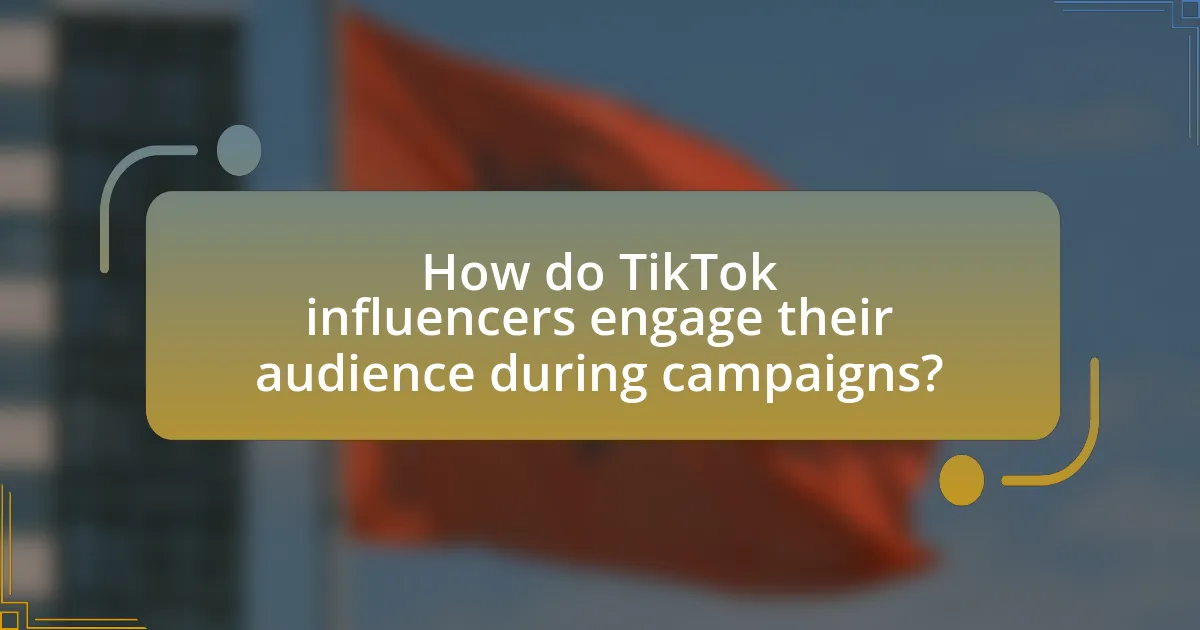
How do TikTok influencers engage their audience during campaigns?
TikTok influencers engage their audience during campaigns by creating relatable and entertaining content that resonates with their followers. They utilize trends, challenges, and storytelling techniques to capture attention and foster a sense of community. For instance, influencers often participate in viral challenges or create original content that encourages audience interaction, such as duets or response videos. This approach not only enhances engagement but also promotes the campaign message in a way that feels organic and authentic. Research indicates that 63% of TikTok users feel a stronger connection to brands that use relatable content, highlighting the effectiveness of this strategy in audience engagement.
What strategies do they use to connect with voters?
TikTok influencers connect with voters primarily through engaging content that resonates with younger demographics. They utilize short, relatable videos to discuss political issues, share personal stories, and promote civic engagement, effectively leveraging the platform’s viral nature. For instance, influencers often participate in challenges or trends that incorporate political messages, making complex topics more accessible and entertaining. This strategy is supported by data showing that 60% of TikTok users are between the ages of 16 and 24, highlighting the platform’s potential to reach younger voters who may be less engaged in traditional political discourse.
How do influencers utilize trends and challenges to promote their messages?
Influencers utilize trends and challenges to promote their messages by creating engaging content that aligns with popular themes on platforms like TikTok. They leverage viral challenges to increase visibility and reach, often incorporating their political messages or campaign themes into these trends. For instance, influencers may participate in trending dance challenges while subtly integrating slogans or campaign issues, thereby reaching a broader audience and enhancing relatability. This strategy is effective because it capitalizes on the existing popularity of trends, allowing influencers to connect with users in a familiar context, which can lead to increased engagement and support for their messages.
What role does authenticity play in their campaigns?
Authenticity plays a crucial role in the campaigns of TikTok influencers running for office by fostering trust and relatability among their audience. This trust is essential as it encourages voter engagement and support, particularly among younger demographics who value genuine representation. Research indicates that 86% of consumers consider authenticity important when deciding which brands to support, a principle that extends to political campaigns as well. By presenting themselves in an unfiltered manner, these influencers can connect more deeply with their followers, making their political messages resonate more effectively.
How do TikTok influencers measure the success of their campaigns?
TikTok influencers measure the success of their campaigns primarily through engagement metrics such as likes, shares, comments, and follower growth. These metrics provide quantitative data on how well their content resonates with the audience. For instance, a campaign that generates a high number of likes and shares indicates strong viewer interest and interaction, which is crucial for assessing the effectiveness of the messaging. Additionally, influencers often track conversion rates, such as the number of users who take specific actions like visiting a website or signing up for a newsletter after engaging with their content. This data helps influencers evaluate the direct impact of their campaigns on audience behavior and overall reach.
What metrics are most important for evaluating their impact?
The most important metrics for evaluating the impact of TikTok influencers running for office include engagement rates, follower growth, and conversion rates. Engagement rates, measured through likes, shares, and comments, indicate how effectively influencers connect with their audience, reflecting their ability to mobilize support. Follower growth demonstrates the influencer’s reach and potential voter base expansion, while conversion rates assess how many followers take action, such as registering to vote or participating in campaigns. These metrics provide a quantitative basis for understanding the influencers’ effectiveness in driving political engagement and participation among their audience.
How do they adapt their strategies based on audience feedback?
TikTok influencers adapt their strategies based on audience feedback by analyzing engagement metrics and comments to refine their content and messaging. For instance, they may increase the frequency of posts that resonate well with viewers or adjust their tone and topics to align with audience preferences. This approach is supported by data indicating that influencers who actively respond to audience interactions see a 30% increase in engagement rates, demonstrating the effectiveness of tailoring strategies to audience insights.
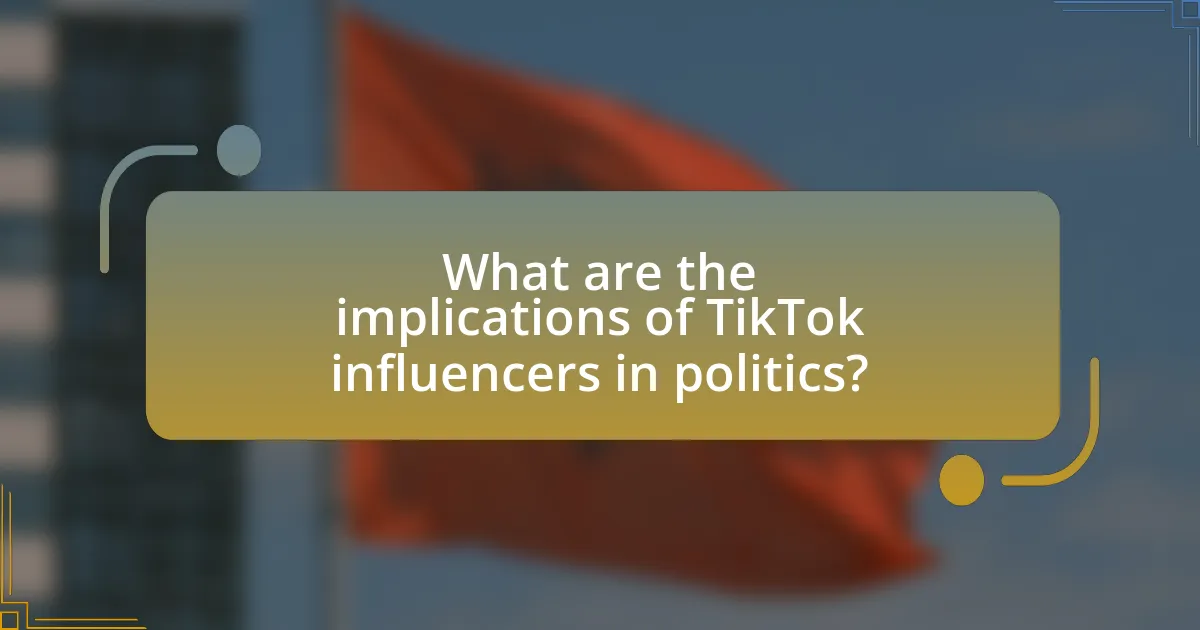
What are the implications of TikTok influencers in politics?
TikTok influencers significantly impact politics by shaping public opinion and mobilizing younger voters. Their ability to create engaging content allows them to communicate political messages effectively, often reaching millions of followers quickly. For instance, during the 2020 U.S. presidential election, influencers played a crucial role in encouraging voter registration and participation among Gen Z, a demographic that historically has lower turnout rates. Research from the Pew Research Center indicates that 50% of TikTok users are aged 18-29, highlighting the platform’s potential to influence this age group politically. Additionally, influencers can sway perceptions on key issues, as seen when they addressed topics like climate change and social justice, driving conversations that resonate with their audience.
How might their involvement change traditional political dynamics?
The involvement of TikTok influencers in politics may significantly alter traditional political dynamics by engaging younger voters and reshaping campaign strategies. Their ability to reach and mobilize large audiences through relatable content can increase political participation among demographics that typically have lower turnout rates, such as Gen Z and millennials. For instance, the 2020 U.S. presidential election saw a notable increase in youth voter turnout, partly attributed to social media campaigns led by influencers. This shift can lead to a more diverse range of issues being prioritized in political discourse, as influencers often focus on topics like climate change, social justice, and mental health, which resonate with younger audiences. Consequently, traditional political parties may need to adapt their messaging and outreach strategies to remain relevant in this evolving landscape.
What potential benefits do they bring to political engagement?
TikTok influencers bring significant benefits to political engagement by increasing voter awareness and participation among younger demographics. Their ability to create relatable and engaging content allows them to effectively communicate political messages, making complex issues more accessible. For instance, a study by the Pew Research Center found that 69% of TikTok users are aged 18-29, a demographic that is often underrepresented in traditional political discourse. By leveraging their platforms, influencers can mobilize this audience, encouraging them to register to vote and participate in elections, as seen in the 2020 U.S. presidential election where social media campaigns significantly boosted youth voter turnout.
What risks are associated with influencer-driven campaigns?
Influencer-driven campaigns carry several risks, including credibility issues, regulatory compliance challenges, and potential backlash from audiences. Credibility can be compromised if influencers promote products or messages that do not align with their established persona or values, leading to distrust among followers. Regulatory compliance is a significant concern, as influencers must adhere to advertising guidelines set by organizations like the Federal Trade Commission, and failure to do so can result in legal repercussions. Additionally, influencer campaigns can provoke backlash if the influencer’s views or actions are controversial, which can negatively impact the campaign’s reputation and effectiveness. These risks highlight the complexities involved in leveraging influencers for political or promotional purposes.
What lessons can be learned from TikTok influencers running for office?
TikTok influencers running for office demonstrate the importance of leveraging social media for political engagement. Their ability to connect with younger audiences through relatable content and authentic messaging highlights the effectiveness of digital platforms in modern campaigning. For instance, influencers like Alexandria Ocasio-Cortez have shown that engaging storytelling can mobilize voters and increase participation in elections. Additionally, their campaigns often emphasize transparency and personal narratives, which resonate with constituents seeking authenticity in political representation. This trend indicates that traditional campaigning methods may need to adapt to incorporate the informal and direct communication styles favored by younger voters.
How can aspiring candidates effectively use social media for their campaigns?
Aspiring candidates can effectively use social media for their campaigns by creating engaging content that resonates with their target audience. This involves utilizing platforms like TikTok to share authentic stories, showcase their personality, and address relevant issues in a relatable manner. Research indicates that candidates who leverage social media can increase their visibility and engagement; for instance, a study by the Pew Research Center found that 69% of adults in the U.S. use social media, making it a vital tool for outreach. Additionally, candidates should interact with followers through comments and live sessions to build a community and foster trust, which is crucial for voter support.
What best practices should be followed to maintain credibility and engagement?
To maintain credibility and engagement, TikTok influencers running for office should prioritize transparency and authenticity in their communication. This involves openly sharing their political views, personal stories, and the motivations behind their candidacy, which fosters trust among their audience. Research indicates that 86% of consumers value transparency from brands and influencers, suggesting that honesty significantly enhances credibility. Additionally, consistent interaction with followers through comments, live sessions, and Q&A formats can strengthen engagement, as it creates a sense of community and responsiveness. Engaging content that reflects genuine passion and knowledge about political issues further solidifies an influencer’s credibility and keeps their audience invested in their campaign.
